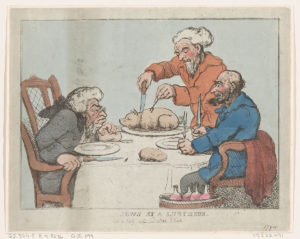When we think of anti-Semitism, we tend to see it as a single historical phenomenon: the hatred of Jews. Of course it had different manifestations in different times, from the birth of Christianity, through the Roman Empire adopting it, the Inquisition of the dark middle aged, Luther’s statements, up to the modern era – and what was perhaps its fullest embodiment: Nazism. It is generally assumed that the hatred of Jews that generated the Holocaust was the outcome of two thousand years of Christian anti-Semitism. But is this really the case?
Uriel Tal (1921-1984), an Israeli historian, was a highly original and profound thinker, a scholar in the field of the history of ideas. Born in Vienna to a family of renowned rabbis from Galicia, he moved with his family to Berlin, and then back to Vienna. In 1939 his parents sent him by himself to Palestine, hoping they would shortly follow him. But they were arrested and spent two years in Bergen-Belsen concentration camp; they were later released, and immigrated to Palestine. Uriel studied history at the Hebrew University in Jerusalem; his doctoral thesis focused on anti-Semitism in the Second Reich. He later became a history professor at Tel Aviv University. His untimely death at the age of fifty-seven prevented the full development of his insightful historical observations.
In his writings, Tal provides a unique angle on anti-Semitism and Nazism. He distinguishes between Christian and non-Christian anti-Semitism. Christianity, he argues, never wanted to annihilate Judaism altogether. The Jews have a unique role in Christian theology: in the second coming of Christ, they will accept him as the Son of God and will convert to Christianity. This is part of Christian eschatology – the part of theology that concerns the final events of history. Thus, in spite of the endless persecutions, which included deportations, physical torture, and social and economic isolation, the Church – both Catholic and Protestant – wished to keep Judaism alive. Anti-Semitism was both cultivated by the Church, portraying the Jew as the embodiment of radical evil, and restrained by it. When attacked by a Jew-hating crowd, Jewish communities often turned to religious rulers for help.
But non-Christian anti-Semitism is an altogether different phenomenon. “Modern anti-Semitism may also be understood as neither shaped nor reinforced by Christian anti-Jewish tradition, and being to a certain extent opposed to this tradition, especially when we consider that many of the leaders of anti-Semitism in the second and third Reichs in their rejection of Judaism had also rejected Christianity. Furthermore, racial anti-Semitism was a denial of one of the basic tenets of the Christian Heilsgeschichte, the eschatological hope (in theory) and missionary zeal (in practice) as set forth by Paul (Epistles to the Romans 9-11) according to which the Jews were still eligible for salvation and will deserve to regain their lost prerogative when they accept Jesus as the Messiah.”
Racial anti-Semitism, then, stands in contrast to the Christian perception of Jews. Racist ideas ascribe no importance to man’s choices – even if they may take place at the end of time. Once born to a certain race, one cannot change it. From this perspective, Jews could never be altered by accepting Christ as the Son of God; they cannot be altered at all. Theoretically, even if Jews would have adopted Nazism, the Nazis would still have wanted to annihilate them, since they are an inferior race.
Racial ideas were already quite developed in late nineteenth century Germany, though, of course, they would reach full political exercise only decades later. Yet most racial thinkers were reluctant to give explicit expression to their reservations about Christianity. On the contrary, they wanted to use the common Christian sentiment of Jew-hatred in order to advance their own racial ideas. In doing so, they raised some rather bizarre arguments: “Some of the leading exponents of racial anti-Semitism proclaimed that their movement not only departed from Christianity but sought to overcome it by integrating it completely into racial conception. Christianity itself, by its very conception, was anti-Jewish or anti-Semitic; its original and enduring impulse was to overcome Judaism, and this could not be accomplished by the conversion of Jews but by their extermination”.
This twisted logic, assuming that racial anti-Semitism was somehow the true fulfillment of Christianity, rested on a subjective identification of the believers with Jesus and the Gospels, not on theological thinking. In the closing years of the nineteenth century and in the first decade of the twentieth, these two conflicting elements – racial and Christian anti-Semitism – were consolidated into a relatively unified ideology. The claim that Christianity should be ‘liberated’ from Jewish influence somehow made sense. Only later, when the Nazis turned openly against the Church, was the inner contradiction of this ideology fully exposed. But years of pretending that these two forms of Jew-hatred were one contributed to the permeation of racial ideas, without arousing any significant objections.
Uriel Tal’s fascinating historical analysis can be found in Christians and Jews in Germany: Religion, Politics and Ideology in the Second Reich (Cornell University Press, 1974) and also in Religion, Politics and Ideology in the Third Reich: Selected Essays (Routledge, 2004) – published two decades after his death.

In my opinion, we are ‘people’.
Therefor are we perceived as a race or a religion or both?
Thanks!
This is quite fascinating and helpful to my own thinking on the topic of antisemitism. Thank you for posting!!
Indeed, a very interesting question!
Were he still alive I wonder how Professor Tal would characterize the anti-Semitism found in non-Christian countries around the world today.